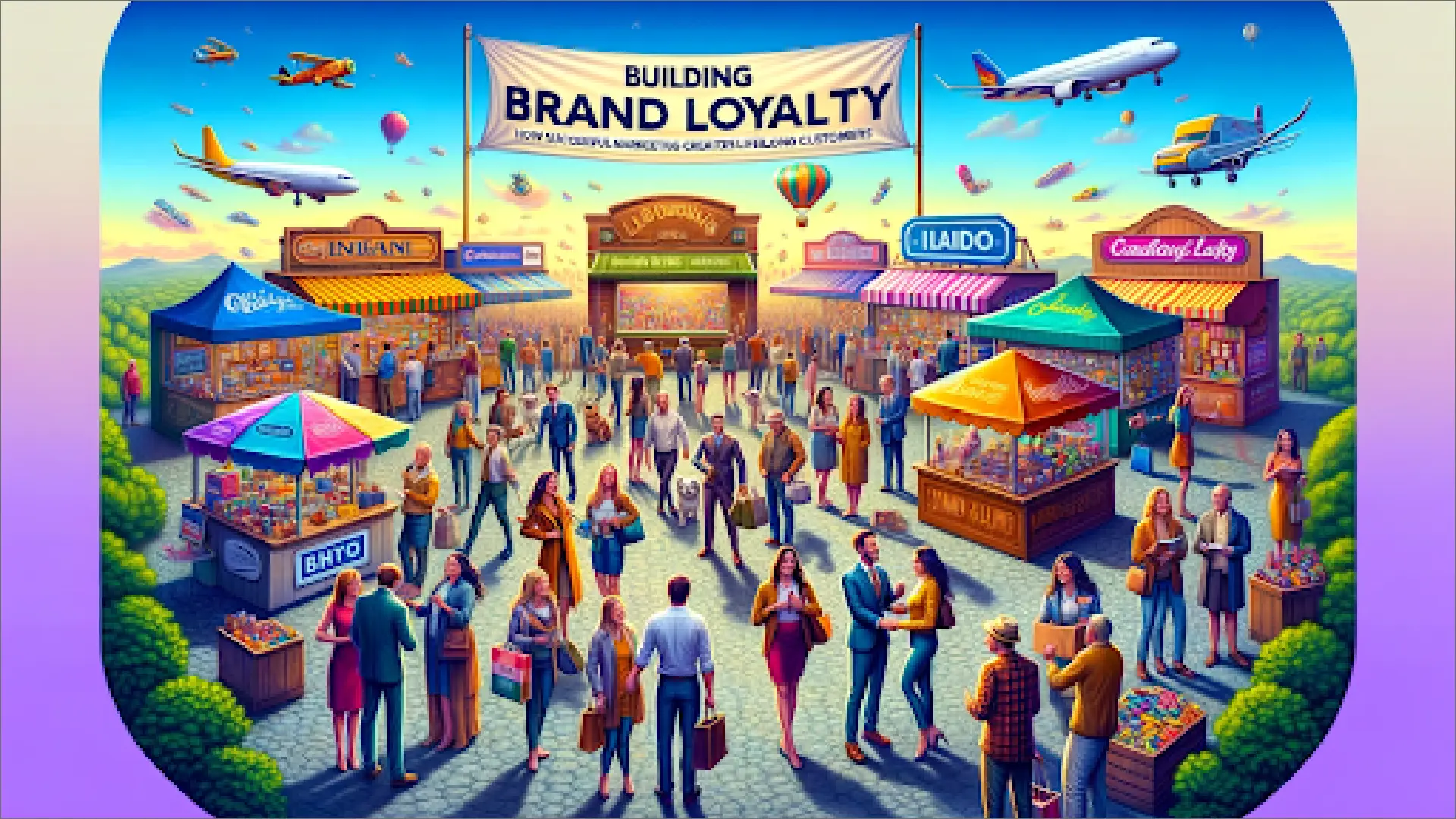Building Brand Loyalty: How Successful Marketing Creates Lifelong Customers

In the ever-evolving landscape of consumer markets, brand loyalty is a cornerstone for enduring success. In an age where options are abundant and switching costs are low, the ability to foster a loyal customer base can distinguish a thriving brand from a fleeting one. This loyalty transcends the mere act of repeat purchasing; it represents a deep-seated allegiance that customers develop towards a brand, making them less susceptible to competitors’ allure.
The significance of brand loyalty is multifaceted, impacting everything from word-of-mouth promotion to the stability of a brand’s revenue streams. Therefore, understanding and cultivating this loyalty is paramount for businesses aiming for longevity and market dominance.
The art and science of effective marketing are at the heart of building brand loyalty. Marketing strategies that resonate with the audience authenticate brand values and consistently deliver value can transform casual customers into brand ambassadors. This blog delves into the mechanisms through which successful marketing cultivates brand loyalty, highlighting strategies that have proven effective across various industries.
By exploring the psychological underpinnings of brand loyalty and examining real-world examples, we aim to provide actionable insights for businesses striving to create a loyal customer base. The journey from a first-time buyer to a lifelong customer is complex and multifaceted, involving trust, satisfaction, and emotional connection. Through strategic engagement and a deep understanding of consumer needs, brands can navigate this journey, turning transient interactions into lasting relationships.
What is Brand Loyalty?
At the heart of brand loyalty lies an emotional and psychological attachment customers form with a brand, compelling them to select it over its rivals repeatedly. This allegiance goes beyond mere habit or convenience; it signifies a profound trust and connection, reflecting the belief in the brand’s capacity to fulfill its promises and align with customer values. Incorporating the concept of outsourcing digital marketing services into this dynamic underscores the importance of differentiating between customer satisfaction and genuine brand loyalty.
While customer satisfaction is transactional and rooted in specific interactions with a product or service, brand loyalty is relational, indicating a deeper, lasting commitment to the brand. Outsourcing digital marketing services can play a pivotal role in nurturing this loyalty by leveraging expert strategies to deepen customer relationships and reinforce the trust and connection that are essential for long-term loyalty.
The psychology behind brand loyalty is complex, involving elements of identity, belonging, and emotional investment. Customers often see their preferred brands as extensions of their identities, making choices that reflect their values, aspirations, and social selves. This identification creates a sense of belonging to a community of like-minded individuals, further reinforcing their loyalty. Moreover, emotional attachments can develop, characterized by trust, affection, and even love towards the brand. These emotional dimensions make loyal customers more forgiving of minor brand missteps and more resistant to competitive offerings.
Understanding the dynamics of brand loyalty is essential for businesses aiming to cultivate it. By recognizing that loyalty extends beyond rational assessments of value or satisfaction, brands can tailor their marketing strategies to resonate on a deeper emotional level. This involves meeting and exceeding customer expectations, consistently delivering on brand promises, and engaging customers meaningfully. In the following sections, we will explore specific marketing strategies that have proven effective in building brand loyalty, drawing on insights from brands that have successfully navigated this complex landscape.
Role of Successful Marketing in Building Brand Loyalty
Successful marketing is pivotal in building brand loyalty, as it bridges the gap between consumer expectations and brand experiences. Key to this process is the development of a strong, coherent brand identity that resonates with the target audience. This identity must be consistently communicated across all marketing channels, from traditional advertising to digital platforms, ensuring a unified brand message that is easily recognizable and memorable.
Effective marketing strategies go beyond mere promotion, engaging customers emotionally and creating value beyond the product or service itself. Content marketing, for example, can educate, entertain, and inspire audiences, fostering a sense of connection and loyalty. Social media platforms offer unparalleled opportunities for direct engagement, allowing brands to interact with customers in real time, respond to their needs, and build a community around shared values and interests. In this landscape, partnering with a skilled webflow agency can amplify these efforts by crafting visually compelling and user-friendly digital experiences that resonate with your target audience, enhancing overall brand engagement and loyalty.
Understanding and catering to the target audience is another crucial aspect. Market research and data analytics play a significant role in uncovering customer preferences, behaviors, and expectations. This insight enables brands to personalize their marketing efforts, tailoring messages and experiences to meet the specific needs of different customer segments. When done correctly, personalization enhances the customer experience, making individuals feel valued and understood, which fosters loyalty.
Case Studies: Brands That Excel at Loyalty
i. Apple
Apple is a quintessential example of brand loyalty, with a dedicated customer base that eagerly anticipates product releases and passionately advocates for the brand. This loyalty stems from innovative products, a seamless ecosystem, and a strong brand identity emphasizing simplicity, innovation, and quality. From minimalist advertising to immersive retail experiences, Apple’s marketing strategies reinforce these brand values, creating a loyal community of users who identify with the brand’s ethos.
ii. Nike
Nike has cultivated brand loyalty through inspirational marketing campaigns that go beyond selling products to champion values and empower individuals. The “Just Do It” slogan encapsulates this approach, resonating with consumers’ aspirations towards athleticism and personal achievement. Nike leverages endorsements, community initiatives, and digital platforms to connect with its audience emotionally, building a loyal customer base that values the brand’s commitment to inspiration and innovation.
Strategies for Building Brand Loyalty
1. Personalization in Marketing Efforts
Tailoring marketing messages and experiences to individual preferences and behaviors can significantly enhance customer loyalty. Build a user-friendly website by implementing creative web designs. These websites provide complete information about your brand to the customers and attract more leads. Brands can leverage customer data to create personalized communications, offers, and product recommendations, making each interaction feel unique and valued.
2. Creating a Community Around the Brand
Fostering a sense of community among customers can strengthen emotional bonds and loyalty. This can be achieved through social media engagement, brand-sponsored events, and platforms that encourage user interaction and content creation.
3. Customer Service Excellence
Outstanding customer service is a critical component of brand loyalty. Brands that go above and beyond to address customer needs, resolve issues promptly, and exceed expectations can turn satisfied customers into loyal advocates.
4. Leveraging Social Proof and Testimonials
In the form of customer reviews, testimonials, and user-generated content, social proof can reinforce brand credibility and loyalty. Encouraging satisfied customers to share their positive experiences can attract new customers and deepen the loyalty of existing ones. A nimble social media agency will have the expertise to repurpose social proof and testimonials into content that connects with your target audience.
5. Rewards Programs
Well-designed rewards programs can incentivize repeat purchases and foster loyalty by offering tangible value in exchange for continued engagement. These programs should be easy to understand and participate in, offering relevant and desirable rewards to the brand’s audience.
Future of Brand Loyalty
Technological advancements and shifting consumer values will increasingly influence brand loyalty as we look to the future. Technologies like AI, AR, and VR have the potential to revolutionize customer experiences, offering new ways for brands to engage with their audiences and personalize interactions.
Additionally, consumers are becoming more values-driven, seeking brands that align with their ethical, social, and environmental concerns. Brands that can navigate these evolving landscapes, leveraging technology to enhance customer experiences while authentically embodying their values, will be well-positioned to build and maintain loyalty in future years.
Final Words
Building brand loyalty is a complex endeavor that requires a strategic approach to marketing, a deep understanding of consumer psychology, and a commitment to exceeding customer expectations. By leveraging personalization, fostering community, prioritizing customer service, and adapting to technological and societal shifts, brands can cultivate loyal customer bases that drive long-term success. The journey towards brand loyalty is ongoing, demanding constant innovation and engagement, but the rewards—increased customer retention, advocacy, and brand equity—are well worth the effort.
Read More: What is a High Perplexity Score in GPT Zero?



